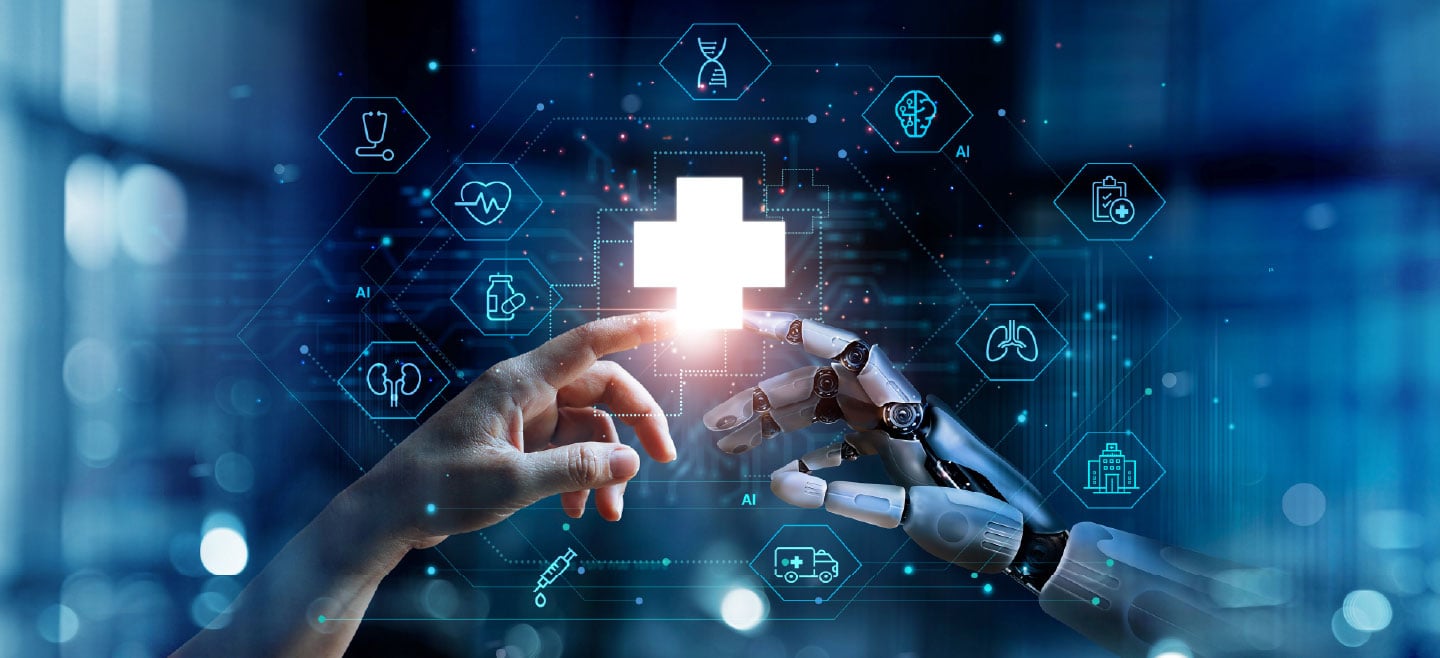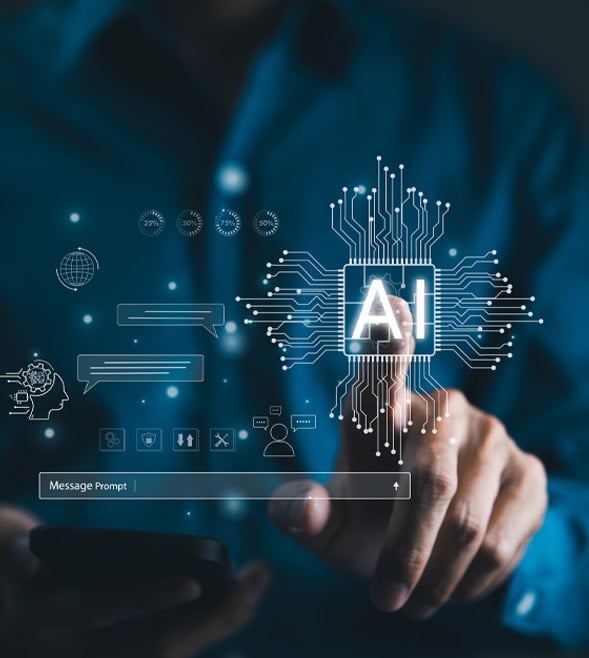
Robotics in healthcare is revolutionising surgical precision, enabling minimally invasive procedures, and assisting in post-operative recovery through robotic exoskeletons and physical therapy aids. Robotic systems are also being used in elder care, patient monitoring, and logistics within hospitals, improving efficiency and safety.
What once seemed futuristic, such as AI-powered diagnostics and virtual assistants, now shapes everyday healthcare. While algorithms analyse data and detect patterns in the background, the real potential lies in combining machine intelligence with human empathy and experience.
AI in life sciences is changing how healthcare professionals detect risk, engage with patients, and deliver proactive care. It is making healthcare more predictive, more accessible, and more tailored to individual needs.
Key AI use cases across healthcare and life science
- Drug discovery and development: The process of discovering new medicines is being transformed by advanced computational models. Traditionally lengthy and costly, drug development now benefits from analysing vast datasets of chemical compounds, simulating interactions with the human body, and identifying promising candidates much faster. AI is helping in accelerate the process, reduce costs, and improve the success rate of finding new drugs and makes the drugs more effective. One of the most impactful applications of AI in life sciences has been in protein structure prediction. Accurately determining the three-dimensional shape of a protein based on its amino acid sequence has long been a major challenge in biology. Recent advances in AI have made it possible to predict these structures with remarkable accuracy, helping researchers better understand biological mechanisms and accelerate areas such as drug discovery, genomics, and disease modelling.
- Medical imaging and diagnostics: Advanced AI algorithms enhance the accuracy and speed of interpreting medical images. They can detect subtle signs of disease in X-rays, MRIs and CT scans, often before they are visible to the human eye. In fields such as pathology and ophthalmology, AI helps identify cancerous cells and screen for diabetic retinopathy, supporting faster and more precise clinical decisions. Researchers are exploring AI models that can analyse human sounds such as coughing, speech and breathing to help detect early signs of respiratory conditions like tuberculosis. These technologies have the potential to support earlier diagnosis, particularly in countries where the disease burden is high. Healthtech companies are also developing AI-based tools to assess lung health using sound analysis. Some are considering the integration of advanced models to further improve their capabilities. In parallel, multimodal AI systems are being developed to interpret a broad range of medical data, including chest X-rays, mammograms, dermatology images, retinal scans, radiology, pathology slides, health records and genomic information. These tools are designed to assist clinicians in making faster and more informed decisions, ultimately enhancing patient care.
- Personalised medicine: Every patient is unique, and AI is helping healthcare move beyond one-size-fits-all treatments. By analysing genetic information, lifestyle factors and medical histories, AI can personalise therapies to better meet individual needs. Oncology platforms such as Tempus and IBM Watson for Oncology and Genomics analyse tumour genetics to recommend targeted therapies, improving outcomes and reducing side effects. Apollo Hospitals has adopted Watson for Oncology and Watson for Genomics to help physicians provide patients with personalised, evidence-based cancer care.
- Early disease prediction (predicting risk through data): Healthcare professionals use AI to analyse data from electronic health records, wearables and behavioural patterns to identify early warning signs that might otherwise go unnoticed. This supports earlier intervention for conditions such as diabetes and mental health disorders, helping to advance preventive care.
- Supporting patients with virtual assistants and AI agents: AI agents, AI-driven virtual assistants and chatbots provide patients with answers to health questions, symptom checking, medication reminders, and chronic condition support. Particularly helpful outside clinic hours or in areas with limited healthcare staff, these tools maintain patient engagement while ensuring data privacy through robust safeguards. Agentic AI has the potential to transform the healthcare and life sciences industry. It may assist in solving complex tasks through reasoning, planning, managing workflows and taking actions. In future applications, agentic systems could operate with a degree of autonomy to support various aspects of healthcare delivery. Examples can include agents for medical testing, diagnostics, appointment scheduling, billing, insurance processing and pharmacy support. With the rise of transformer architectures, large language models and generative AI, tools such as ChatGPT, Gemini, Claude and others have become increasingly visible. In parallel, domain-specific models like BioBERT and Med-PaLM have been developed for healthcare and life sciences. These models are adapted from general-purpose architectures but trained on biomedical data to better understand medical terminology and context. Such models are beginning to support use cases like virtual assistants and AI agents that interact with clinicians and patients.
- Robotic surgery: Robotic surgery also known as robo assisted surgery allows doctors to perform many types of complex procedures with more precision, flexibility and control than is possible with traditional procedures. Robotic surgical systems powered by AI enhance precision, control, and consistency during operations. Robotic surgery is often performed through tiny incisions. But sometimes it's used in open surgeries. robotic surgery system includes a camera arm and mechanical arms with surgical instruments attached to them. The surgeon controls the arms while seated at a control center, called a console, near the operating table. The surgeon sees a magnified, high-definition, 3D view of the surgical site. The da Vinci Surgical System, for example, facilitates minimally invasive procedures with improved accuracy, reducing recovery time and complication risks, benefiting both patients and surgeons.*
- Remote monitoring and personalised preventive care: Wearable and implanted devices enhanced by AI are increasingly used to monitor vital signs such as heart rate, oxygen saturation and blood sugar levels. These technologies can alert healthcare professionals to potential issues in real time, supporting more proactive and personalised care, particularly in remote or underserved areas. Humanoid robots are also beginning to play a growing role in elderly care across several countries. They offer support by providing companionship, assisting with daily routines and contributing to cognitive and physical rehabilitation. Equipped with technologies such as generative AI, computer vision, speech recognition, natural language processing and Internet of Things sensors, these robots are being explored for use in homes, clinics and hospitals. One example is a social humanoid robot developed to assist in healthcare environments. It has been used in areas such as patient engagement, rehabilitation and health education. Its features typically include facial recognition, emotion detection and conversational abilities, making it a potentially valuable companion in elderly care settings.
- Detecting public health threats early: AI can analyse digital signals such as search trends and social media activity to help identify outbreaks or emerging health threats. During recent public health crises, AI tools have detected unusual regional patterns at an early stage, enabling authorities to respond more swiftly. These technologies have the potential to support risk prediction, contact tracing, disease forecasting and detailed outbreak detection. Such capabilities are likely to be essential in managing future public health challenges. Certain AI systems are designed to monitor open-source data, including online reports in multiple languages, to spot early signs of outbreaks even before they are officially recognised.
- Supporting doctors with AI copilots: AI copilots are increasingly helping healthcare professionals reduce administrative workloads and enhance clinical decision-making. These tools can assist with tasks such as medical transcription, patient data entry, drafting clinical notes, summarising patient histories, suggesting possible diagnoses, and supporting real-time decision-making. When integrated with Electronic Medical Record (EMR) or Electronic Health Record (EHR) systems, they help streamline workflows and allow clinicians to focus more on patient care. Some of the latest AI copilots also feature voice-enabled capabilities, offering a hands-free experience that supports clinical documentation and helps automate routine administrative tasks. This enables doctors to spend more time engaging with patients and making informed care decisions.
- Faster claims processing and insurance workflow automation: Automation through AI is speeding up claims processing, fraud detection and reimbursement workflows. AI-powered systems can accelerate claims resolution by automating routine tasks, improving accuracy and reducing the need for human intervention. This results in quicker claims settlements, better customer experiences and lower operational costs for insurance providers.
While traditional enterprise automation tools, such as robotic process automation (RPA), have been effective for rule-based and repetitive tasks, they often lack autonomy and adaptability, making it difficult to handle complex workflows. Newer technologies like agentic AI and intelligent automation are being developed to overcome these limitations. These advanced systems are designed to reason, plan, utilise external tools and manage more dynamic processes. Some insurers are beginning to adopt AI solutions to enhance administrative efficiency. Applications include eligibility verification, document processing and fraud detection, all aimed at increasing accuracy and reducing processing times.
Overcoming challenges in AI adoption
Despite its benefits, AI in healthcare presents real challenges. In mental health, particularly, continuous alerts and data updates can overwhelm some individuals. Constant reminders of health risks may promote caution, but they can also cause anxiety or distress.
AI can recognise speech or behavioural patterns linked to depression, but it can’t offer empathy or emotional support. Mental health care still relies heavily on human presence and emotional intelligence, qualities that build trust and drive recovery.
To maximise AI’s impact while maintaining trust and safety, healthcare systems must address several key areas:
- Data quality and interoperability: AI depends on clean, accurate, and unbiased data. Health systems must ensure seamless data exchange and compatibility across platforms.
- Training healthcare professionals: Healthcare professionals must feel confident using AI tools. Providing AI literacy in medical training will ensure these technologies enhance rather than hinder clinical practice.
- Protecting patient privacy: Robust protection of patient information is essential. This includes encryption, clear consent protocols, and secure access systems.
- Responsible AI and AI security: AI in healthcare must be ethical, explainable and secure. Models should be trained on diverse datasets to avoid bias, with safeguards in place to protect sensitive health data from misuse or cyber threats.
- Keeping healthcare human: AI should support, not replace, human care. The connection between patient and provider remains central to effective treatment. Technology must strengthen this relationship, not weaken it.
- Successful adoption of AI in production: AI tools must be integrated into clinical workflows with proper validation, training and support. Success depends on regulatory readiness, user confidence and measurable improvements to patient care.
A Human-centred approach to innovation
It’s not far when humans would live on laboratory made blood, 3D-printed organs. We would be wearing devices that augment our vision, speech and brain.
AI is not designed to replace doctors, nurses, or caregivers; rather, it supports them by extending their capabilities. When applied thoughtfully, AI enhances the effectiveness of preventive care, making healthcare systems more efficient, accessible, and personalised.
As the technology continues to advance, its role in prevention will grow, facilitating earlier interventions and expanding access to care. Yet, while AI can improve decision-making and streamline services, the heart of healthcare remains human.
Healthcare is about more than identifying illness; it is about supporting life and well-being. AI can provide critical insights, but only human connection can offer the empathy and trust that patients need. By integrating technological intelligence with compassion and clinical judgement, we can build a healthcare system that detects risks early and delivers care that truly supports people.
To achieve this, we must ensure that innovation goes hand in hand with a commitment to human-centred values.




